“It’s been a few years, and I’m still processing all the horrors and trauma I saw when I was working with MSF,” Karen Stewart said. That’s Médecins Sans Frontières, Doctors Without Borders to us in the U.S. But foreign traumas weren’t the only ones she experienced.
Stewart had her own house of horrors to contend with. Maybe that’s why she wanted to get away. When she was young, it was through drugs and alcohol. Later on, it was to Nigeria, Indonesia, Zimbabwe, Papua New Guinea, Sri Lanka, the Democratic Republic of Congo, India, Bangladesh, and Uzbekistan.
Her assignments with Doctors Without Borders had her working in danger zones where civil wars often raged. The results were not only death, but disfigurement, rape, and torture. And above all, fear.
Stewart, as a mental health professional, with a Master’s in Social Work from the University of Denver, didn’t do the medical side, sewing up bloody wounds or amputating limbs, but the wounds she and her team dealt with were just as real.
As manager of in-country teams, Stewart got the overview of all the suffering. But she also witnessed hope.
“The resilience and hope I’ve seen after all the torture, family raped and killed, I’m simply amazed….. [It’s] very powerful to see people, especially women who have lost everything, [been] raped, witnessed [their] family tortured and killed, every possible loss, yet they have hope,” she said.
“The connection to each other, to family, [is] such a contrast to us here in the U.S. where we can live in a house for 10 years and not know our neighbor,” she said.

An example of the sense of community on one of her assignments. Farewell celebration with Anastasia and Sarah in Lae, Papua, New Guinea
Maybe the sense of community she found both within victim groups and with her teams was what kept her going back for assignment after assignment.
Now
Sitting at a cozy coffee shop near one of Denver’s nicest parks, with outside tables bathed in sunshine and moms with strollers sipping lattes, Stewart, now 58, grimaced when asked her worst assignment. She fingered her cup, as if It were hard to pick one.
“The Congo was hell on earth. No paved roads, rural villages and camps, tropical rain forests, jungle, high humidity. It was a civil war and the front lines changed all the time. Over 100 armed troops [were] active, new insurgencies [were] forming, all civilians were terrified and terrorized and constantly being displaced by the war,” she said.
On this quiet, sunny Denver day, her time in the Congo was clearly a world away. Stewart looks like she has lived world’s away. She had pulled up on a well-used bike (she doesn’t own a car), wearing baggy jeans and a freedom for animals T-shirt. And she ordered tea.
Then
Aside from the fear of attacks, her hell in the Democratic Republic of Congo centered around overseeing mental health therapy in a sexual violence clinic. “Twenty women a day came in who had been raped, and about a third needed reconstructive surgery,” she said, “so the trauma was severe, both physical and psychological.”
Early on, she had told Doctors Without Borders that she’d take any assignment, as long as it was not exclusively focused on sexual violence. But sexual violence it was, in spades in so many of her assignments.
For example, in Papua, New Guinea there was the 10-year old girl whose father incested her often and whose mother pressed charges. Her mother was murdered and the girl was made to live with her father.
“It was a crazy place,” Stewart said. Crazy in that domestic violence was “so extreme.” About 50 to 60% of women and children were sexually assaulted, “rape and incest were rampant, 6- 8- 10-year olds were victims,” she said.
Maybe that contributed to why it was so hard. But by the time she was asked to go to the Congo, she had seen so much trauma, she went where she was needed.
AIDS Therapy
Her first deployment was in 2004. She was sent to Lagos, Nigeria to manage of a team of peer health educators and adherence counselors focusing on HIV/AIDS.
“At that time,” Stewart said, “in the U.S, HIV/AIDS was all about Antiretroviral drugs. In Nigeria, it was not about drugs, but grief and loss.”
Many, many people died. What drugs there were, according to Stewart, required meticulous management.
“They had to be taken twice a day at exactly the same time. If a patient took them even a half hour off, they could develop a resistant virus and the drugs wouldn’t work.”
Three teams, including doctors, nurses, counselors, and other staff was composed of 50 Nigerians. They treated 1,000 patients, equally men and women. Stewart managed two groups of counselors. About five counselors were peer health educators who were openly HIV positive “which was a huge risk given the stigma and discrimination they faced. They were to provide hope and role modeling to the newly diagnosed.”
They provided education on nutrition, the importance of clean water, and lifestyle issues such as practicing safe sex. The other counselors educated patients on taking their medications and making sure they understood it was a lifelong commitment.
According to Stewart, many Nigerian men “mess around,” but if a wife tested positive, “she’d be thrown out of the house.”
Although she saw the good she and her counselors were doing, Stewart couldn’t help but feel the unfairness of that, and the ensuing trauma for wives and families.
After about 15 months there she came back to Denver and took two months off. Her next assignment in 2005 was in Banda Aceh, Indonesia, “ground zero” for the 2004 Southeast Asia tsunami. But it turned out to be more than rebuilding houses and infrastructure, after all, she was with Doctors Without Borders.
“When the tsunami hit, there had been a 30-year civil war. That meant 30 years of fighting, death, rape, kidnapping, and torture. So although we were there for post-tsunami care, what we confronted was far worse,” Stewart said. “My team [15 counselors including four Indonesian psychologists] had to deal with grief, death, torture, and depression.”
After this assignment, as with her others for Doctors Without Borders, Stewart said she needed a break.
The Trauma of Incest and Rape
Her job in Papua, New Guinea, referenced above, was to set up a domestic and sexual violence clinic.
“It was a crazy place,” Stewart says. Crazy in that domestic violence was “so extreme. Law enforcement was abysmal, corruption widespread. Being a girl meant living in a constant state of fear.”
Again, her work life centered on sexual violence. This was especially hard for Stewart because of her past. She and her sister were victims of incest.
Stewart had tried to run from it – and the traumatic memory of it – many times.
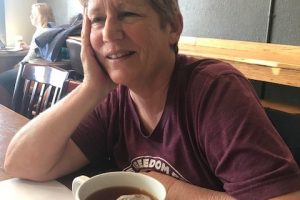 Born in California, Stewart’s family moved a lot with her father’s job as an engineer.
Born in California, Stewart’s family moved a lot with her father’s job as an engineer.
They lived in Scotland when she was 14 and Stewart found that drugs and alcohol were easy to come by. She used often and by 15, just about daily.
Her family moved to Michigan, then moved away when she was 16. Stewart didn’t move with them. She stayed in Michigan with her drug dealer and became a dealer herself.
“I was not even 18,” she said, “and I got busted lots of times, mostly in Detroit. But I was underage, so nothing much happened to me.”
It was a downward spiral from there. She didn’t know why she needed to get away from reality, only that she had to. When she was 18, she and her dealer moved to Denver. Four years later, after seven years of addiction to both booze and drugs, she and “Bill” were done, and she was homeless. At 22 years old, she hit rock bottom. She checked herself in to a treatment center.
The Trauma of Addiction
“I had no intention of getting sober,” she said, “but I needed a place to stay.“
When your motivation is a roof over your head, not getting clean, you’re not committed. She left after 30 days. What followed were several years of addiction, relapses, clean and sober times, and pain. Finally, she decided to kick her addictions.
She checked into a center that practiced aversion therapy, “forcing you to drink 15 drinks in 15 minutes which made you violently ill.” (After she left, several years later, “the center was closed because several people died of heart attacks” from being so traumatically ill.)
After aversion therapy, she spent eight months – of an 18-month program – at a center that used “humiliation therapy.”
“The idea was to break you,” Stewart said. “But I finally thought, I need to be rebuilt.”
“Many chose prison over this place, I met people who finished the program and they were robotic. That’s what caused me to run away at the 8-month mark. I didn’t want to be like them.”
She had endured eight months of humiliation, fear of having her head shaved, as they did to many, sitting in a 10-foot high chair, and other break-you-down methods. She thought she was clean.
Finally Clean
She spent the next 11 years getting a bachelor’s degree, working at the post office as a letter carrier, working at shelters and drug and alcohol facilities, relapsing, and making a suicide attempt. That was brought on when she realized what her father had done to her. She somehow worked through it. And in 1989, she really did get clean, she finally felt “in recovery, and has been ever since,” she said proudly.
The University of Denver accepted her for the master’s program in social work in 1989, she earned that degree then she worked in various mental health and HIV/AIDS clinics, hospitals, and other counseling centers until another trauma struck when she was 42.
Another Wake-Up Call
 In 2002, her only sister, Linda, three years older than Stewart, killed herself at age 45. Linda had moved to Australia, but that didn’t distance her from her childhood trauma. Stewart took it hard.
In 2002, her only sister, Linda, three years older than Stewart, killed herself at age 45. Linda had moved to Australia, but that didn’t distance her from her childhood trauma. Stewart took it hard.
“I dropped 60 lbs., I could barely function. She took her life on Father’s Day,” Stewart recounts, “and that was so symbolic…”.
She confronted her mother (who was divorced from her father). It was another step in her healing. And in 2004, about two years after her sister’s death, not happy with her life, “single, with no children, no pets, and no debt, and laid off from my employer, I decided to follow my dream of working internationally,” she said.
Coming out in Nigeria
She applied to Doctors Without Borders and was accepted. In her first assignment to Northern Nigeria in 2004, Stewart faced an additional challenge at the Nigerian HIV/AIDS clinic.
In Nigeria, gays and lesbians are often stoned to death. The death sentences are imposed by the high courts and generally supported by the community.
After a local stoning on two men, Stewart heard her clinic staff say, “Yes, kill them all, they all deserve to die, they’re all pedophiles.” This disturbed her on a deep level. Stewart is a lesbian.
“I had a fierce need to combat the tremendous hate, fear, and misunderstanding [aimed at gays]. I could not stand back and allow this group of 50 people to not see the other side, I wanted them to have in their psyches, having known and liked, even some loved, a lesbian,” she said.
She had thought about it long and hard for weeks, rehearsed who she should tell and what exact words she would use. And only after her primary assignment was over and she was leaving in a few weeks did she tell, carefully planning the sequence of who, and at what level of privacy, some alone, some in twos or threes.
“I was well aware it would not be fair or reasonable to make this extreme announcement when I was still ‘boss lady,’” she said. “I expected to be ostracized.”
She wasn’t. At one point her Nigerian supervisor hugged her and that was a moment she said she will never forget.
Triumphing over Trauma
Having experienced her own traumas and overcome them, Stewart seems dedicated to easing the pain of others.
“I had PTSD,” she said, “after each assignment.” And between deployments, she often said she would not, could not, go back.
But recently, she said she might accept another assignment with Doctors Without Borders.
“It’s about responding to another human being who is suffering,” Stewart said.
____________________________________________________
Story by Bojinka Bishop
In-country photos provided by Karen Stewart and show various assignments.
To learn more about the work of Doctors Without Borders or to donate to support their important work, visit https://www.doctorswithoutborders.org/
For more stories about fascinating people, their struggles, and their impact on the world, click on the People tab in the blue navigation bar at the top of any page. And explore all tabs for exclusive content. And if you enjoy these stories, please Subscribe! And if you’re feeling generous, please Donate.
See Comments. Click here. Share your ideas and comments. Click here.
Related stories:
- She’s swum a long way, babyWhen Lauren Havens was 12 she showed up at the pool to join the junior high boys water polo team in Beverly Hills, CA. It was 1975. Her brother played, but girls didn’t really play water polo. And certainly girls didn’t coach it. That was then. ...
- Helping our heroes, our first respondersPeople never get numb to tragedy. Even our first responders, firefighters, EMTs, police officers, and doctors sometimes see things so disturbing they need a way to deal with them. It’s Mary Rollinger’s job to help. But that doesn’t mean it’s easy for her, either....
- Today he’s Denver’s king of cannabis … tomorrow?When I mentioned to a Colorado state official that I was doing a story on Kayvan Khalatbari and planning to call him “king of cannabis,” the guy nodded his head and said, “that fits.”...
- Laughter, the best career medicine?What does a sense of humor have to do running a homeless shelter? Being a sales manager? A nursing assistant? A ballroom dance instructor? A certified archeologist? Or a mediator? A lot – if you’re Tonya Dalhaus who also parleyed it into a stint as a stand-up comic....
- Back to high school – with a new purpose“Social media make conflicts extremely difficult to deal with. I’m glad I didn’t have Facebook in high school,” Charla Agnoletti said. You’d expect this from someone over 40. But Agnoletti is only 26. It’s because she’s in the thick of it....
Comment(s) on Triumphing over Trauma
FlyingHighSolo.com
Celebrating special people, good ideas, and useful actionsSubscribe
Keep on top of what's new – subscribe to Flying High Solo! You'll get a brief email alerting you to new articles. (Your email is safe -- we will not share it with anyone).
What readers are saying
"amazing variety of topics"
"an intelligent, strong, creative, eclectic approach .... that we don't get a chance to read everyday"
"very cool and intelligent"
Highly Recommended
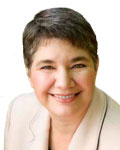 Bella DePaulo's blog for Psychology Today, "the truth about singlism..." News, analysis, facts, and stories about being single in America
Bella DePaulo's blog for Psychology Today, "the truth about singlism..." News, analysis, facts, and stories about being single in America

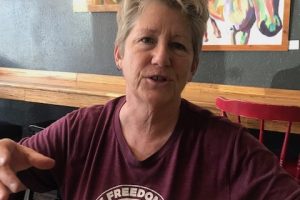

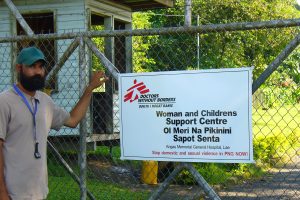
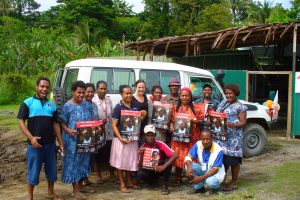
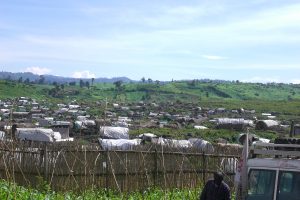
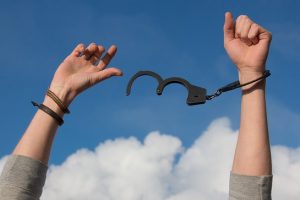






This article about Doctors Without Borders provides us all with an intimate experience of the horror in Congo and many other countries, without our being there. The idea that “hope” is still possible under these brutal conditions is a lesson for us all, one that gives us gratitude for all we have and take for granted. It always seems that people who have experienced their own brutality, grief and loss are the ones at the forefront of providing solace for others, as Karen is doing. An excellent story to be remembered and a caring woman to be honored for her work!
Karen Stewart–This is an interesting story about a survivor who chose to step out of her own “stuff” and help others deal with trauma. I could certainly feel pain of her struggle in the storytelling. We never know what is going on inside other people—their battles especially on the other side of the world after catastrophes like the Tsunami. At least she did not give up and is still willing to find “hope” in helping others through their traumas.
This is such a heart wrenching story of Karen’s life and of the torture that so many people go through daily. Karen you have opened our eyes on what is going on in so many countries and right here in Denver, Colorado. I am sorry you had such a trauma filled childhood. Through all of this you have become wonderful woman. Without reading this story I knew you had a story to tell. I could feel greatness in you when we first met. Proud of what you have become and how much heart ache it took to over come. You did it!! Glad you are in our group. Great work Karen
Thank you for your lovely and inspiring words Karilyn.
A big thank you to Bojinka for taking the tremendous amount of time to sit with me and write a beautiful piece and capture my story!
I see every mission, every placement as a honor.
To be accepted and permitted to assist.
I have experienced incredibly difficult situations, dangerous and scary times and intensely touching moments.
I am in awe as I see and connect with people filled with resilience, hope, and tremendous courage.